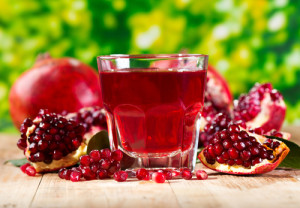Are We Going To See An Explosion Of Food Labeling Lawsuits?–POM v. Coca-Cola (Forbes Cross-Post)

Photo credit: glass of pomegranate juice with fresh fruits on wooden table // ShutterStock
Implications
1) No FDA safe harbor. Prior to the POM ruling, many advertising lawyers believed that FDA guidance provided a safe harbor from false advertising claims. In other words, if the advertiser followed the FDA’s position, no other legal harm would befall it. Now, we know that FDA guidance to food/drink manufacturers will provide a floor but typically not a ceiling for legal obligations; simply following the FDA’s instructions won’t (in most situations) negate legal obligations under the Lanham Act.
2) Food and drink labels are like other advertising. Similarly, prior to the POM ruling, advertising lawyers typically treated food and drink labels as subject to different (and less onerous) legal scrutiny than other types of advertising. The ruling means that now food and drink labels must go through the same legal review screening process as other types of advertising.
3) Consumers are still likely to be confused. The FDA’s definitions of specific foods and drinks can be voluminous and baffling. For example, the FDA makes distinctions between “cheese,” “pasteurized process cheese,” “pasteurized process cheese food,” “pasteurized process cheese spread,” “pasteurized prepared cheese product” and “pasteurized process cheese product.” (This Wikipedia entry provides some explanation). Similarly, the FDA distinguishes between “juice,” “juice drinks” and “juice beverages.” I doubt that many, if any, consumers understand the semantic nuances between these terms. Will the new overlay of Lanham Act false advertising laws improve that situation? I doubt it. Now, judges will proliferate their own individual interpretations of various FDA definitions, further degrading the chance that consumers will understand what manufacturers are saying.
Will There Be An Explosion of Food Labeling Lawsuits?
Earlier this year, in the Lexmark case, the Supreme Court unanimously held that a wider group of plaintiffs could bring Lanham Act false advertising claims. Combined with the POM case, the Supreme Court has twice this year issued plaintiff-friendly interpretations of the Lanham Act cases.
So does the Supreme Court’s enthusiasm for the Lanham Act mean we’re about to see a flood of Lanham Act lawsuits? The answer is probably not.
Although the Lanham Act now applies to food and drink labels, the POM ruling doesn’t apply to other false advertising laws (such as state laws), which are still precluded. Further, competitive injury is still required to have Lanham Act standing, so the POM ruling doesn’t provide individual consumers and class action lawyers with any new rights to directly sue over food and drink labels.
Still, the POM ruling gives new powers to plaintiffs who suffer competitive injuries, and the Supreme Court believes those parties should use the Lanham Act to keep each other honest. For example, the court says:
Because the FDA acknowledges that it does not necessarily pursue enforcement measures regarding all objectionable labels, if Lanham Act claims were to be precluded then commercial interests—and indirectly the public at large—could be left with less effective protection in the food and beverage labeling realm than in many other, less regulated industries. It is unlikely that Congress intended the FDCA’s protection of health and safety to result in less policing of misleading food and beverage labels than in competitive markets for other products.
However, when industry competitors all adopt similar practices, none of them want to challenge each other in court (“those in glass houses shouldn’t throw stones”). POM was frustrated that it provided higher percentages of pomegranate juice in its offerings but was being undercut on price by a substitute using cheaper inputs. However, if POM had been playing equally fast-and-loose with its definitions of juice, then it wouldn’t risk poking its competitor in court. Given how often industry competitors all cut corners similarly, the number of competitors who will embrace their new enforcement powers under the Lanham Act isn’t likely to be huge. As a result, I anticipate this ruling will lead to only a minor uptick in competitor false advertising lawsuits over food and drink labeling.
Case citation: Pom Wonderful LLC v. Coca-Cola Co., 12–761 (U.S. Supreme Court June 12, 2014).
